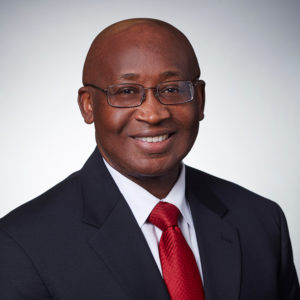September 16, 2021
Watch





Listen
Read

Mark has extensive experience identifying emerging healthcare issues, developing policy solutions, working with policymakers, and engaging diverse stakeholders. Over the course of his career, he has been directly involved in the development of major health legislation such as the Balanced Budget Act; the Medicare Prescription Drug, Improvement, and Modernization Act; and the Affordable Care Act.
He has over 30 years of experience developing and implementing health policy, including prior positions as the executive director of Medicare Payment Advisory Commission; assistant director of Health and Human Resources at the Congressional Budget Office; deputy director of health plans at the Centers for Medicare and Medicaid Services; health financing branch chief at the Office of Management and Budget; and senior research associate at the Urban Institute.
Mark holds a Ph.D. in public policy analysis from the State University of New York at Binghamton and an M.A. and B.A. in political science from Old Dominion University.

Dr. Marty Makary is a New York Times bestselling author and leading voice for transparency in health care. He is the recipient of the 2020 Business Book of the Year Award for The Price We Pay. A professor at the Johns Hopkins Bloomberg School of Public Health, he has published over 250 scientific articles on the re-design of health care, medical innovation, and vulnerable populations. Dr. Makary has been elected to the National Academy of Medicine and is Editor-in-Chief of Medpage Today. He has written for The Wall Street Journal, The New York Times, and USA Today and is a frequent medical commentator.
Clinically, Dr. Makary practices pancreas surgery and has pioneered novel operations at Johns Hopkins. He is the recipient of the Nobility in Science Award from the National Pancreas Foundation and has been a visiting professor at over 20 medical schools.
Dr. Makary was the lead author of the original publications on the surgery checklist and later served in leadership roles at the World Health Organization. Dr. Makary is the chairman of the African Mission Healthcare medical advisory board and leads several health care collaboratives. His current research focuses on the underlying causes of disease and relationship-based medicine.
His book Unaccountable turned into the T.V. series “The Resident” and his newest bestselling book of The Price We Pay was has been described by Don Berwick as “a deep dive into the real issues driving up the price of health care” and by Steve Forbes as “A must-read for every American”. He speaks nationally and internationally on the appropriateness of care, lifestyle choices that influence health outcomes, employee health benefits design, and health care costs.
Dr. Makary is a graduate of Bucknell, Thomas Jefferson and Harvard University. He completed his surgical training at Georgetown University and his fellowship at Johns Hopkins Hospital.

Nancy-Ann DeParle is a managing partner and co-founder of Consonance Capital Partners, a private equity firm that focuses on investing in the U.S. health care industry. She is a director of CVS Health and HCA, in addition to Consonance portfolio companies Enclara Pharmacia, Turn-Key Health, and Psychiatric Medicare Care. From 2011-January 2013, she was Assistant to the President and Deputy Chief of Staff for Policy in the Obama White House. A health policy expert, DeParle served as Counselor to the President and Director of the White House Office of Health Reform from 2009-2011. In that role, she spearheaded President Obama’s successful effort to enact the Affordable Care Act and managed the initial implementation of the law.
After leaving the White House in 2013, DeParle was a Lecturer in Law at Harvard Law School and a Visiting Scholar in Economic Studies at the Brookings Institution. From 2006-2009, DeParle was a Managing Director of CCMP Capital Advisors, a private equity firm formed by the former buyout professionals of JPMorgan Partners, LLC. She was also a Senior Fellow of Health Systems at the Wharton School of the University of Pennsylvania and a trustee or director of several corporate and non-profit boards, including Boston Scientific, Cerner, Health Affairs, Medco Health, and the Robert Wood Johnson Foundation. From 2002-2008, she was a commissioner of the Medicare Payment Advisory Commission (MedPAC), which advises Congress on Medicare policy matters.
From 1997-2000, DeParle served as Administrator of the Health Care Financing Administration (HCFA), now the Centers for Medicare and Medicaid Services (CMS). As Administrator, she directed Medicare, Medicaid, and the State Children’s Health Insurance (SCHIP), which provide health insurance for more than 105 million Americans at an annual cost of $870 billion. Before joining HHS, DeParle served as Associate Director for Health and Personnel at the White House Office of Management and Budget (OMB).
Earlier in her career, DeParle was Commissioner of the Tennessee Department of Human Services, administering a 6,000-employee cabinet agency. She also worked as a lawyer in private practice in Nashville and Washington, D.C. She has appeared on many news programs and speaks frequently at health and financial industry conferences. In 1994, Time selected DeParle as one of “America’s 50 Most Promising Leaders Age 40 and Under.”
DeParle received a B.A. with highest honors from the University of Tennessee, where she was Student Body President, and a J.D. from Harvard Law School. She also received a B.A. and M.A. in Politics and Economics from Balliol College of Oxford University, where she was a Rhodes Scholar.
DeParle lives in Chevy Chase, MD, with her husband, Jason DeParle, a reporter for the New York Times, and their two teenaged sons.

At CMS, Seema Verma was the architect of CMS’s strategic vision, implementing over sixteen tactical initiatives aimed at transforming the American healthcare system to lower costs, improve quality, and increase access. During her tenure, Verma led federal government efforts to infuse market competition, empower patients, and unleash innovation producing historic reforms. She also drove efforts to require price and quality transparency while ensuring patients have ownership over their portable medical records.
Verma’s historic “Patients Over Paperwork” initiative reduced regulatory burden and saved the healthcare system billions of dollars. Verma also worked to accelerate value-based care transformation and address the social determinants of health by advancing new payment models throughout CMS programs, including models for drug pricing that resulted in lower insulin prices. Under her leadership, premiums dropped in Medicare Advantage, Part D, and the insurance exchanges. In response to COVID-19, she led industry-changing efforts to drive telehealth and remote care across the healthcare system while creating flexibility for health providers to augment the health care workforce, expand services and testing, and ensure access to vaccines and therapeutics.
Prior to CMS, Verma was the founder and CEO of a health policy consulting firm helping states and private industry on a range of healthcare issues. Verma received her BS in life sciences from the University of Maryland and her Master’s Degree in Public Health (MPH) with a concentration in health policy and management from Johns Hopkins University.

Major General Granger, M.D., is the President and CEO of The 5Ps, LLC, a Centennial, Colo.-based health-care, education, and leadership consulting organization, since August 6, 2009. Prior to his retirement from the US Army on July 1, 2009, MG Granger served as the Deputy Director and Program Executive Officer of the TRICARE Management Activity, Office of the Assistant Secretary of Defense (Health Affairs), Washington, DC, from December 2005 to May 2009. In this role, he was the principal advisor to the Assistant Secretary of Defense (Health Affairs) on DOD health plan policy and performance.
In his role leading, MG Granger required strong, value-based relationships with major insurers to be affiliates. This required clear guidelines to assess and determine “best value”. A rigorous process was implemented to ensure clear requirements and criteria to manage these relationships to measurable, accountable outcomes.
He oversaw the acquisition, operation and integration of DOD’s managed care program within the Military Health System. MG Granger led a staff of 1,800 in planning, budgeting and executing a $22.5 Billion Defense Health Program and in ensuring the effective and efficient provision of high-quality, accessible healthcare for 9.2 million Uniformed Service members, their families, retirees and others located worldwide.
Gary Bisbee 0:06
Washington, D.C., is my home away from home. I’ve worked here for the better part of three decades as a founder, entrepreneur, policy expert and author.
Don Rucker 0:10
Probably the longest title. Everybody sort of shortened it to ONC for sanity’s sake.
Gary Bisbee 0:15
Mercifully.
I’ve learned leadership secrets from many health care executives who understand that Washington is the largest payer and regulator of health care.
Nancy-Ann DeParle 0:25
She said, well, because you’ll never get a husband if you do that.
Gary Bisbee 0:29
I began interviewing health care leaders many years ago because what better way to learn how they think, why they make it to the top and how they remain there?
Think about, what was your most challenging engagement.
Greg Carpenter 0:40
Health care has been the most difficult problem, as you said.
Gary Bisbee 0:43
We’ll talk about that later.
In 2019, Americans spent $3.8 trillion on health care, accounting for about 18% of America’s GDP. According to CMS, health care costs are expected to reach $6.2 trillion in 2028. Health care affordability will be the defining challenge of this decade. For this special episode, we’ll examine the challenges of affordability. To begin, Dr. Mark Miller, VP of healthcare at Arnold Ventures, will start the conversation on why affordability is an important issue. Then, we’ll hear from four other healthcare experts to discuss potential solutions. We will hear from Dr. Marty Makary, Johns Hopkins surgeon, health policy expert, and author of The Price We Pay, who will dive into cost savings and Medicare. We will hear from two health care professionals on Medicaid. First, Nancy-Ann DeParle, who is managing partner and co-founder of Consonance Capital Partners and former assistant to the president and Deputy Chief of Staff for policy in the Obama White House. We’ll discuss California’s Medicaid model. Second, Seema Verma, former administrator of CMS, will elaborate on Indiana’s Medicaid model. To conclude, we’ll hear from physician and retired general Elder Granger, former deputy director of TRICARE and CEO of the 5 P’s, who examines the affordability of TRICARE. To begin, let’s listen to Mark Miller on how health care costs burden patients.
Mark Miller 2:26
Affordability from the perspective of the taxpayer, the employer, a family will be the defining issue, whether it’s the sustainability of Medicare and even recently outrunning the HI Trust Fund and the fact that part B just draws from general revenue and how sustainable that is. Employers need to wake up and realize that this is something that they have to address, that it’s eating their budgets. When you have 40% of American families unable to get together $400 in an emergency, we have to do something because the way the health benefit is moving, because of the costs that I’m referring to. They’re pushing much more onto the consumer through deductibles and copayments that they don’t add, so that reckoning feels like it has to come to a head.
Gary Bisbee 3:30
I agree affordability will be the issue of the decade. I don’t think there’s any way out of that. Looks to me like there’s a shifting of risk from the employers and the payers to the consumers and providers. Would you agree with that formulation or not?
Mark Miller 3:50
I do agree with that. The way the providers have responded to it is to consolidate and extract in some instances where they can raise prices or try and design payment systems that help them protect their particular revenue stream. You’ve seen a lot of that in the Alternative Payment Model process where particular groups of providers will come together and say, “Let’s build a payment model around what I do.” Sometimes I think it is well motivated and intended to result in a better product, but I also think there are attempts here where it’s just to build a moat around a particular set of revenue. Things have become less affordable for employers and there has been this redesigning of health benefits to push much more on to the consumer, but to the extent that they can do it.
Gary Bisbee 4:49
Healthcare is made more and more expensive for the consumer. The cost of healthcare in the United States is unsustainable for many Americans. How will we find a solution? Healthcare payments occur at the level of the federal government, state governments, and the individual. This adds complexity and means that addressing affordability will need to occur at multiple levels. Next, Dr. Marty Makary will discuss one method of reeling in the cost of Medicare.
Marty Makary, M.D., M.P.H. 5:20
Affordability is an access path. As a matter of fact, it’s the number one way to increase access and tear down barriers that we see with social determinants of health. We can keep throwing good money after bad into this system. Doctors within miles of the US Capitol Building are putting unnecessary stents in plaques that don’t meet criteria, but they know how to game the system and Medicare paying for all of it. We can keep throwing money into the system or we can start to get wise about using “appropriateness measures.” That’s a big project now that my team and I are doing. How do we identify practice patterns of appropriateness, and maybe replace pre-authorization with gold carding providers that fall within those boundaries of normal variation? Practice variation is good and healthy within boundaries. Turns out, when you talk to experts, the docs will tell you—in that narrow specialty—this is a pattern that’s outside of the boundaries of reason. It’s a pattern that’s indefensible. It’s a pattern that’s a byproduct of our fee-for-service system
Gary Bisbee 6:35
Appropriateness measures create consistency in costs as well as treatment expectations across patients. Medicare and Medicaid combined account for almost 40% of all health care expenditures, and both continue to grow in cost. Next, we’ll hear from two Medicaid policy experts. First up, we have Nancy-Ann DeParle.
Segwaying to the Biden administration, what advice would you give them regarding the ACA and the moves they’re making there?
Nancy-Ann DeParle 7:10
I haven’t sat silently, for sure. I’ve given them some advice. Among my advice is to look at California, to look at the states where it’s been very successful both in getting a lot of people covered and then having competition, holding premium rates down. I believe last year in California the rate increases were less than half a percent. Why is that? It’s because California went all in. It’s because California expanded Medicaid and told the plans, “If you want to be in Medicaid in California if you want to be part of MediCal, great! We would love to have you, but you also need to participate in the marketplaces for the uninsured.” They’ve spent their own money on doing marketing and enrollment in California. They have spent money. Even so, the so-called Young Invincibles have been hard to bring into the marketplace. One thing they’ve learned is that the tax credits to defray the cost of premiums and the subsidies are important. They just went through a round about a year ago of improving that in California and it’s made a difference in getting people into the market. There’s a whole playbook from California of how you go about strengthening this law. By the way, it doesn’t involve a public plan. They haven’t had to do that. They have plenty of competition, so I believe we can do that.
Gary Bisbee 8:40
California’s Medicaid program decreases patient costs by encouraging competition. What do Singapore and Indiana have in common? Singapore’s healthcare system is well known for its savings accounts. It’s a model built on accountability, individualism, and cost savings. This model was replicated in Indiana, so let’s hear from Sima Verma on how Indiana expanded Medicaid with health savings accounts.
Seema Verma 9:09
The Healthy Indiana program was sort of revolutionary and probably is still very novel in the way that it dealt with the Medicaid program. I give a lot of credit to our good friend Mitch Daniels because he really was the one who conceived the idea of trying to do something around consumerism in the Medicaid program. With growing healthcare costs, he felt like it couldn’t just be the insurance companies and the doctors that were responsible for trying to lower healthcare costs, that we needed to engage the patient and the consumer, so the idea in Medicaid was to have a health savings account which had always been poo-pooed by people because they said, “Low-income individuals can’t manage an account.” We put all of those types of claims to bed. We funded the health savings account to make sure there was enough money and the individuals would also put money into that account. If there’s money left over at the end of the year, they can use that money to offset their own premiums. It really instilled the concept of “if I go to the doctor, this is how much it costs.” I think they tend to value the health insurance that they have. Those principles, the idea of consumer engagement of consumerism, really stayed with me. We tried it in Indiana, it worked very well. That program is still around and those concepts we have seen have been duplicated across the country in other Medicaid programs as well.
Gary Bisbee 10:36
There is more than one way to improve Medicaid that caters to the unique cultures and needs of different states. It’s clear that the mission to decrease costs unites both left and right. Lastly, we’ll hear from General Elder Granger. He discusses if the US military’s model for healthcare could work for the rest of the country.
Many people think that TRICARE would be a terrific model for the country. Does that make any sense? What do you think about it?
Elder Granger 11:05
I do see it as a model because the way it works is that we recruit healthy individuals in terms of the military but, when they come in with a family, when they develop a family, we take the family with all the pre-existing conditions. We put in a very strong preventative population health program that is culture-based and designed to take care of an individual from the time a baby’s born until they get to 26 or until you retire. We call it “from cradle to grave.” It is a very cost-effective program. It has all those things you need in healthcare: access, prevention. We eliminate, to the best of our ability, the social determinants of health. Then, the fact that you have a scrum preventative. You’re not doing a lot of waiting on an individual to get a bad condition and then they come in and need emergency care that’s very expensive. So that is a model of some of the things you see right now in the affordable care act. No co-pays and deductibles came from us. There’s power in that idea in the military. For some of our population that had to pay a copay at a doctor’s visit for a preventive service, we eliminated it. We increased preventative service usage significantly, so I see it as a model. It’s a model that you can basically control the costs over time.
Gary Bisbee 12:30
Patients may forgo preventive care to save money in the short term, but this can cause the patient, insurance, and care providers more in the long term. TRICARE provides a model for a cost-effective program that encourages preventive behavior. When it comes to addressing affordability, there are 1,000s of potential solutions. The catch is deciding which models work together in our complicated system. At the end of the day, healthcare is more than balanced budgets and revenue cycles. It’s about caring for the patients. Affordability and ensuring that patients can afford the care they need is fundamental to the mission of health care. Thank you for joining us.
New episodes will debut every Thursday. Join me in conversations to gain advice and wisdom from CEOs, presidents, and healthcare experts. Health care leadership is hard work, but it becomes more manageable as we learn from the remarkable lives and careers of our guests. I’ll see you there.